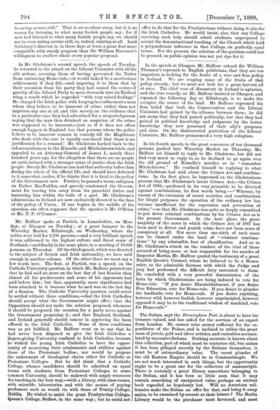In Mr. Gladstone's second speech, the speech of Tuesday, he
returned to the attack on the Liberal Unionists with all his old ardour, accusing them of having prevented the Tories from embracing Home-rule,—it would indeed be a meritorious achievement if they did,—and imputing it to them that by their secession from his party they had caused the centre of gravity of the Liberal Party to move forwards into its Radical wing, a result which he regarded "with very mixed feelings." He charged the Irish police with keeping in confinement a man whom they believe to be innocent of crime rather than not imprison any one at all, and this merely on the evidence that in a particular case they had advertised for a suspected person saying that the man then detained on suspicion of the crime was supposed to be innocent,—just as if it does not often enough happen in England too, that persons whom the police believe to be innocent remain in custody till the Magistrate who deals with the case is equally convinced that there is no justification for a remand ! Mr. Gladstone harked back to the old accusations as to the Kinsella and Mitchelstown trials, and appealed to an Attorney-General of James I., nearly three hundred years ago, for the allegation that there are no people on earth imbued with a stronger sense of justice than the Irish people. Surely Mr. Gladstone has had that authority before him during the whole of his official life, and should have deferred to it somewhat earlier, if he thinks that it is fatal to the policy of the Government now. Further, he passed a warm eulogium on Father MacFadden, and gravely condemned the Govern- ment for tearing him away from his parochial duties and immuring him within the walls of a gaol. Mr. Gladstone's admirations in Ireland are now exclusively directed to the foes of the policy of Union. If one begins in the middle of his speeches, one often supposes that the speaker is Mr. O'Brien or Mr. T. P. O'Connor.






















































 Previous page
Previous page